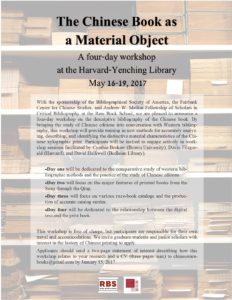In the wake of the fantastic Bibliography Among the Disciplines conference, I’ve decided to consolidate some of my thoughts on a recurring question people ask: “How can I incorporate more of (insert non-western/non-white region/place/thing here), which you study, into my teaching/work?” Here are some preliminary, slightly snarky responses.
- The first thing you should do is what you’re trained to do: read some books. Every East Asianist I know has read books in your field. I don’t care what your field is, they’ve probably read something in your area. I saw this quite a bit at the workshop on global book history organized by Rachel Stein, Ben Nourse and Hwisang Cho. Hwisang, from Xavier University, works on 17th century Korean epistolary culture. He was constantly throwing out references to writing and publishing practices in African American communities in the contemporary US, letter writing practices in pre-modern Yemen, and listening seriously to every perspective people brought to the table. Be like Hwisang.
- Another way to put point 1 is to remember that Hwisang, like many in “Area studies,” has learned to look beyond her/his field for the justification of her/his work. If you are not doing this, you are in a deeply privileged field. Reject that privilege. Tear it out by its roots. You can do this by becoming a better scholar and reading some damn books. This will also help you sniff out bad scholars in area studies. If they justify their work only in terms of its importance to their area of study, don’t bother with them. The last thing you want is people who base their authority on a ‘unique’ culture or understanding. Leave that to creepy nationalists.
- Don’t read randomly. There’s a huge amount of weird stuff in some fields. You don’t want to come out of reading about pre-modern Chinese book history talking about how irrational it was because you’ve accidentally imbibed the racist ideologies of some idiot. Your colleagues should play a role in helping you select readings. I’ve received requests from many of the awesome folks in the Mellon Society of Fellows in Critical Bibliography for readings on Chinese book history (i.e. Liza Strakhov, Meghan Cook ). This is good for me and good for them.
- Listen to and ask questions about the work of colleagues not working in your area. This is a major problem. I’ve seen many Europeanists lose focus as an area studies scholar tries to explain their perspectives. This is demoralizing to me (a white man from Harvard), so imagine what this does to people with less privilege (i.e. basically everyone who is not a white man from Harvard). Continue reading “How to Know What You Don’t Know”
